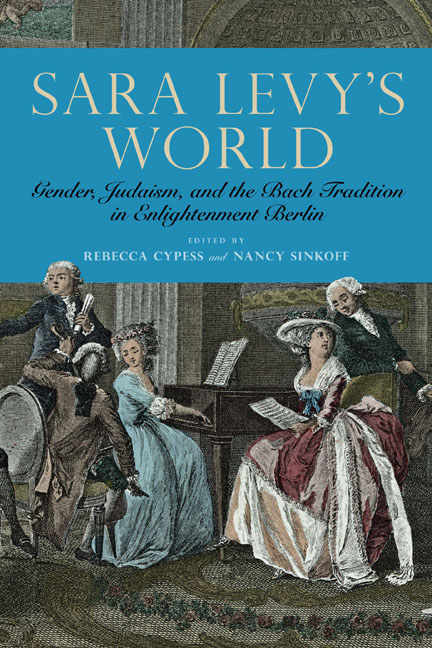Book contents
- Frontmatter
- Dedication
- Contents
- Acknowledgments
- Introduction: Experiencing Sara Levy’s World
- Part One Portrait of a Jewish Female Artist: Music, Identity, Image
- Part Two Music, Aesthetics, and Philosophy: Jews and Christians in Sara Levy’s World
- Part Three Studies in Sara Levy’s Collection
- Appendix: The Salonnière and the Diplomat: Letters from Sara Levy to Karl Gustav von Brinckmann
- Bibliography
- List of Contributors
- Index
Introduction: Experiencing Sara Levy’s World
Published online by Cambridge University Press: 21 April 2021
- Frontmatter
- Dedication
- Contents
- Acknowledgments
- Introduction: Experiencing Sara Levy’s World
- Part One Portrait of a Jewish Female Artist: Music, Identity, Image
- Part Two Music, Aesthetics, and Philosophy: Jews and Christians in Sara Levy’s World
- Part Three Studies in Sara Levy’s Collection
- Appendix: The Salonnière and the Diplomat: Letters from Sara Levy to Karl Gustav von Brinckmann
- Bibliography
- List of Contributors
- Index
Summary
In the opening scene of Aaron Halle Wolfssohn's hilarious and biting satirical play Laykhtzin und fremelay (Yid./Ger., Silliness and Sanctimony, 1796), aesthetics and Jewish tradition are pitted against one another, with Jewish women the leading culprits in a headlong rush into excessive and ruinous modernization through music—both instrumental and vocal. Wolfssohn (1756–1835) was a maskil, an enlightened Jew, and a member of the first generation of Prussian Jews to attempt to live as modern Europeans. In 1785, he arrived in Berlin, the capital of both the Prussian Aufklärung (Enlightenment) and the Haskalah (Heb., Jewish Enlightenment), an ideological movement dedicated to the modernization of Ashkenazic Jewish culture and society. A gifted author in three languages, Wolfssohn soon became part of the circle around the renowned philosopher Moses Mendelssohn, and began to write for the Hebrew Haskalah journal, Ha-me’asef (The Gatherer), becoming its sole editor from 1794 to 1797. Dedicated to the early Haskalah's moderate pathway of modernization, which sought to encourage Ashkenazic Jewry to shed what maskilim (Heb., plural of maskil) believed was obscurantist piety and reform it in the spirit of “reasonable” religion without succumbing to the blandishments of the pseudo-Enlightenment, Wolfssohn found himself—with other maskilim—in a state of despair toward the century's end. The audience for their enlightened works beyond their own circle of Jewish intelligentsia was the sons and daughters of the Jewish bourgeoisie. Yet this group seemed to be headed solely toward becoming modern Germans, abandoning the world of their ancestors almost as quickly as they discarded the Yiddish vernacular for High German. They—and especially their headstrong daughters—were the primary targets of his satire.
The plot of Laykhtzin und fremelay, inspired by Moliere's Tartuffe, unfolds in the home of a Prussian Court Jew, Reb Henoch, a recent returnee to devout religious practice who has hired a certain Reb Yoysefkhe from Poland to tutor his son, Shmuel, in traditional Jewish subjects, such as the Talmud and biblical commentaries. The Polish-Jewish tutor, however, is a sanctimonious and hypocritical charlatan who has designs on the hand of Reb Henoch's spoiled daughter, Yetkhen, whom he tries to woo—all the while chasing the household maid and being a regular client at a working-class brothel.
- Type
- Chapter
- Information
- Sara Levy's WorldGender, Judaism, and the Bach Tradition in Enlightenment Berlin, pp. 1 - 18Publisher: Boydell & BrewerPrint publication year: 2018



